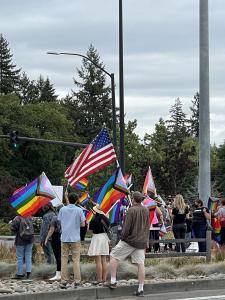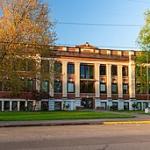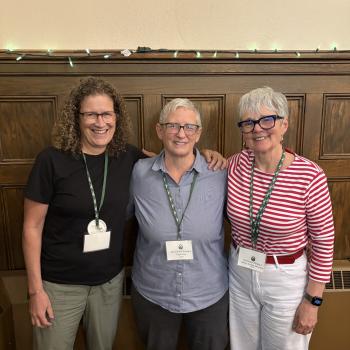Almost three years ago now, members of the Proud Boys waved their flags at what amounts to my small town square, a triangle of land near the city center visible to traffic both coming and going. The white nationalist group felt invited there, heralding their hate in a seemingly once-peaceful community now divided by school board fights over Black Lives Matter and Pride signs, diversity and inclusion policies, parents’ rights, and whether transgender students can use their preferred pronouns in the classroom.
The Proud Boys aren’t the only ones who found welcome here. Since 2021, when a majority alt-right school board won elections and were seated, our city has had racist incidents that made national news, including a school employee showing up for work in blackface, and students “trading” their Black peers in a Snapchat slave auction. A Pride flag was burned on a family’s porch, and just last week, another Pride emblem, displayed at our public library, was shot at, destroying one of the library’s historic windows.

Those are the very visible manifestations of the turmoil in Newberg, Ore., where, in a three-year span, 200-plus educators left our school district because of the board’s regressive policies. That same board hired a superintendent who’d been dismissed from a district already because of racist tweets, and from another for allegedly sheltering a teacher predating on students. Now, there is an anticipated $14 million budget deficit in our schools for next year, and a town so divided that even local social media pages aren’t safe to post on anymore.
Something is deeply broken in my home community.
The same kind of rancor is unfolding in similar ways across the United States, where once-staid school board and city council rooms have become tinder boxes, ignited by the cultural wars happening nationwide and fueled by those insisting—like the Proud Boys in Newberg—that their version of America is not only right but also white. The chaos caused by these divisions shows no signs of abating, especially when the harm done often seems maliciously intentional.
How Should We Respond?
As a Christian committed to justice and equity, it’s sometimes hard to know how to navigate faith in the town square, especially when that town square itself is populated by Christians who feel assured that their understanding of God and the Bible inform their work.
Bearing witness to God’s call for inclusion in local schools can be difficult when board directors assert that God abhors queer folks, then write policies that reflect their own (and not God’s) abhorrence. Supporting my church’s efforts to house the homeless is challenging when Christians in nearby churches assert that doing so endangers a community’s children. And balancing justice with civility can also feel daunting when calls for civil discourse can mean the erasure of those who have been most hurt by a school board’s or city council’s discriminatory policies.
It might be easy to completely disengage from all politics, especially given how stressful the national political scene seems most days, how chaotic and divisive and depressing. Some days, I feel particularly helpless to change what’s happening nationally, save for voting.
But the disarray in my home community has reminded me that all politics really is local and that we have powerful agency to change conditions for our neighbors by investing in local politics. This is something people in Newberg have started to do, building coalitions to enact change in a community that’s been on fire for several years now.
An added benefit: becoming invested in local politics has been life-changing, transforming my faith and the ways I interact with neighbors and with God.
And still, I have so much more to learn.
Navigating Faith in the Town Square
This new column, Faith in the Town Square, intends to explore the dynamics dividing communities across the United States, reporting on places, like my hometown, where cultural wars—often driven by Christian nationalists—turn neighbors against each other.
I want to examine the ideological rifts that drive these divisions and reflect on ways followers of Jesus might create change in their home communities by advocating for justice and equity. Fundamentally, this column will consider the premise that all politics is local by telling the stories about how local politics have destroyed communities; and also, about places where local politics have succeeded in creating conditions for the flourishing of all a community’s people.
This exploration will be premised on my belief that telling stories—and reading stories and hearing stories—is an important way we can build empathy for one another, affirm the voices of those who are often voiceless, and enact the kind of changes needed to make a real difference in our home communities.
As a long-time professor of English, I’ve placed high value in storytelling as one means of seeking and knowing truth; and, in a time when some people’s stories are being silenced through locally-driven efforts like book bans, amplifying stories that matter can be yet another avenue toward expressing faith in the town square.
After years of relative apathy in our local elections, I’ve found renewed energy in the ability of my neighbors to make changes to our community so that we can all become who we were uniquely created to be. I’m excited about telling some of their stories, and exploring together what it means to act faithfully in the places where we’re planted.
You’re invited to read along—and to reach out, if you have an important story to tell, too.













